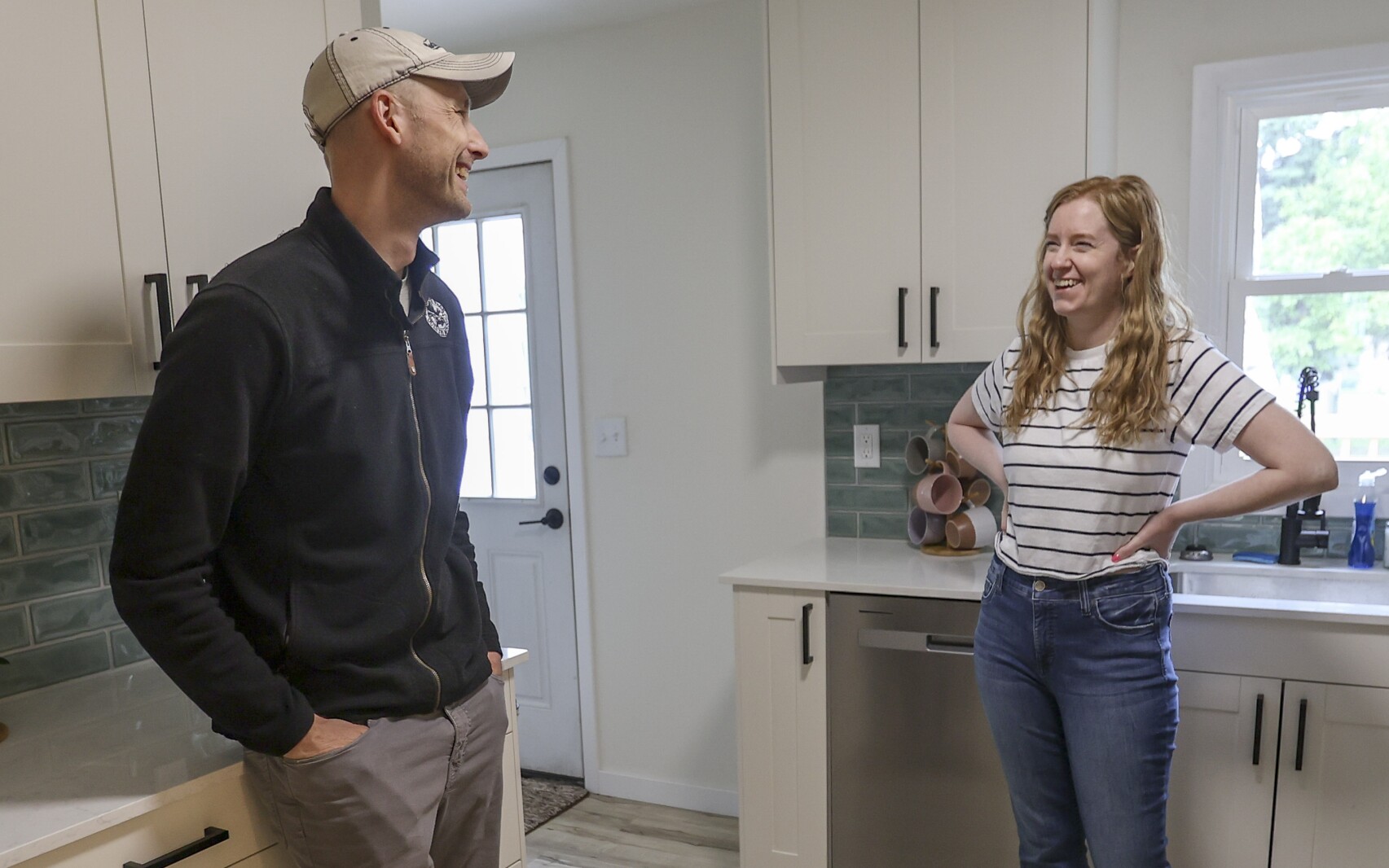WEST FARGO — Owners of short-term rentals in West Fargo say they don’t oppose city regulation of their property, but a proposed provision requiring short-term rentals only be operated by homeowners who consider the property their primary residence would eliminate nearly all the short-term rentals in the city.
Short-term rentals are those that offer rental periods of 29 days or fewer, often listed on sites such as Airbnb or Vrbo.
West Fargo city commissioners initially asked staff in 2024 to draft an ordinance to police short-term rentals. A draft ordinance was presented to the West Fargo Planning and Zoning Commission in March that included a provision that only primary residences would be eligible for short-term rental licenses, meaning properties owned by a business entity or LLC would not be granted a license.
After hearing feedback from residents, the Planning and Zoning Committee removed the primary residence requirement and passed the ordinance on to the City Commission for approval. However, in May,
city commissioners rejected that version of the ordinance and instead directed
staff to draft the ordinance again with the primary residence requirement.
At the May 5 commission meeting, residents Tyler Erickson and David Withee urged the commission to reinstate the primary residence requirement. Both men, the only two who spoke at the meeting regarding the ordinance, said they did not want to see their residential neighborhoods become commercialized.
On June 2, commissioners approved the first reading of the redrafted ordinance with a 3-2 vote. Commissioners Brad Olson and Rory Jorgensen opposed it, while Mayor Bernie Dardis and Commissioners Amy Zundel and Roben Anderson voted in favor.
The ordinance also limits capacity to five unrelated people, mirroring city rules for long-term rentals. Licenses would not be transferable and would need to be renewed annually for $150.

Alyssa Goelzer / Forum file photo
Dardis said he supported the ordinance because it prevents commercial activity from taking place in residential areas. Commissioners cited the potential for short-term renters to cause disturbances while in the homes as a reason short-term rentals could be a nuisance.
Erik Stewart and his wife, Nicole, own three properties in Fargo and West Fargo that they offer as short-term rentals. Stewart said he doesn’t object to licensing short-term rentals but feels the primary residence requirement is an overstep for a problem that doesn’t exist.
“It’s our livelihood,” Erik Stewart said. “It is a little frustrating, because when you go into an investment or you buy a property, there is one set of rules, and they want to over-regulate something that is not even a problem.”
The couple recently acquired their sole property in West Fargo, a twin home they then renovated. Erik Stewart said he fears the venture could be lost as a short-term rental if the ordinance passes with the primary residence requirement.

Alyssa Goelzer / The Forum
He said regulations should be data-driven, meaning if data shows short-term rentals managed by non-homeowners pose a nuisance, then regulation could be appropriate. However, that is not the case in West Fargo, he said.
“In my personal experience of hosting over 100 guests in the last couple of years, I haven’t had a single noise complaint or loud party,” Erik Stewart said. “And anecdotally, that is what the other property managers in the area have experienced.”
At the June 2 commission meeting, Olson asked Police Chief Pete Nielsen how many complaints officers respond to regarding loud parties at short-term rentals.
Nielsen said he did not have exact numbers, but his department “frequently” receives complaints about loud parties or noise.
According to city records obtained by The Forum, West Fargo police responded to 150 calls for loud party complaints in the city between Jan. 1, 2024, and June 5, 2025. Of the 150 calls to loud parties, 73 of them were to addresses that were reported more than once.
The police department does not track the type of properties involved in a complaint.
Of those calls, 20 addresses had two or more complaints of a loud party.
Police were called to the 2900 block of Sheyenne Street 10 times over the past 17 months for loud party complaints, which was the highest number of calls to any location.
The West Fargo Sports Arena and Essentia Health Plaza at The Lights, where outdoor concerts are often held, are in the 2900 block of Sheyenne Street, along with several apartment complexes and other multi-unit housing.

Alyssa Goelzer / Forum file photo
The 2700 block of 14th Street West registered eight calls, and the 2900 block of Bluestem Drive registered six complaints.
All three addresses are in or near mixed-use areas, where residential and commercial developments are located.
A search of full home listings on Airbnb and Vrbo did not show any properties for rent in these areas. All but two addresses in the call list were in mixed-use neighborhoods or neighborhoods comprised of apartment complexes or townhomes.
On Airbnb or Vrbo — the two most popular sites for marketing short-term rentals — hosts can provide several options that help weed out guests who may cause issues.
Hosts and guests are reviewed after their stays, and both are given ratings based on those reviews. Airbnb allows hosts to block renters with low ratings. Another feature requires a potential renter to provide additional information, such as the names of all guests who will be staying at the property and the reason for their stay.
“If someone happens to get through and causes a problem, it’s way easier to get them out” than a long-term tenant, Erik Stewart said. “You can have them removed and just clean it up. There are so many ways to stop the problem before it becomes an issue; you can’t do it with a regular rental.”

Alyssa Goelzer / The Forum
While entire homes can be rented out, hosts also have the option to rent out a single bedroom or share their home with a guest.
Hosts often explicitly explain house rules and leave a handbook for guests. The house rules may include a limit on the number of people in the house, a ban on parties or an outline of quiet hours. If a renter poses a problem or breaks the “house rules,” hosts may personally handle the issue, get assistance from the websites or call the police and require the renters to leave.
The majority of renters come to West Fargo for three reasons, Stewart said: for work, an event or health care.
Short-term rentals can offer a more affordable option than hotels. This is especially true for families that require multiple bedrooms or bathrooms as the price of renting two rooms of a hotel can be upwards of $200 per night, according to hotel booking sites, while the price of renting an entire house can be less than $100 per night, according to short-term rental sites.
Short-term rentals are also popular for traveling nurses. Health care facilities often use a system of traveling nurses who are assigned to work at particular facilities for a few weeks at a time.
Hosts can ban one-night rentals, which Erik Stewart said have historically been the source of party or noise complaints for other hosts.
Potential for far-reaching benefits
Erik Stewart pointed out that individuals or businesses hoping to invest in a property and turn it into a short-term rental often buy a property that needs improvements, which owners typically do. This, in turn, benefits the surrounding neighborhood.
“I’ve had a lot of neighbors come up to me and thank me for renovating and improving the neighborhood,” he said.
Renovations can lead to higher property values, which generate more property taxes.
Airbnb and Vrbo, as well as other general booking sites, collect sales tax on their rentals. The city of West Fargo collects a 2.5% sales tax, which includes a half-cent public safety sales tax, a half-cent economic development sales tax and a one-and-a-half-cent capital improvement sales tax.
In a letter to Dardis, Noah Ford-Dunker, who owns four West Fargo properties as part of a short-term rental company, said his company alone contributed more than $11,200 in sales tax in 2024. The proposed ordinance would eliminate the eligibility of nearly all of the 40 properties used as short-term rentals in West Fargo, Ford-Dunker wrote, as most are owned by or registered to a business or LLC.
He said the elimination of those rentals would result in a loss of approximately $70,000 to $80,000 per year in city sales tax revenue.
According to an email from Nick Martinez, a staff member with Airbnb, to Planning Director Aaron Nelson, there is no way to discern how many rental properties are the primary residence of the hosts. However, Martinez said, it appears 65% of the listings are properties used for purposes other than short-term rentals throughout the year.
“Hosts are normal, everyday people who live and work in West Fargo. Many hosts share their homes to help afford rising property taxes and cover the costs of other critical expenses,” Martinez said in the email. “They’re individuals who often can’t put their home on the long-term secondary rental market for a variety of reasons and are trying to make ends meet to support their families while living in a challenging and expensive real estate market.”
Martinez also cautioned that the primary residence requirement is potentially unconstitutional. A similar requirement in New Orleans was struck down by a district court that ruled the requirement violated the U.S. Dormant Commerce Clause, which prohibits states and local governments from restricting interstate commerce. The primary residence requirement could also be deemed discriminatory against renters who wish to participate in home-sharing in the short-term rental market.
Erik Stewart said he plans to speak at the next commission meeting, when commissioners will hear the second reading of the ordinance, scheduled for 5:30 p.m. Monday, June 16.
“I want to come from a place of understanding,” he said. “Generally, we all want well-run properties, and we are in favor of reasonable regulation that tracks the bad apples. We all want the same thing, we just have to agree that the data doesn’t show — and our experience doesn’t show — there is an actual problem worth regulating.”







